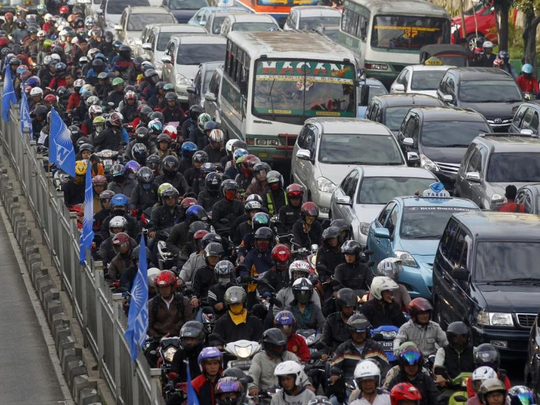
Jakarta: Peering down from one of Jakarta’s many skyscrapers the city’s infamous traffic looks like a tangle of spaghetti, with strings of red brake lights in every direction. Recently, little peas seem to be rolling around in the mix: the distinctive green helmets of motorcycle taxis signed up to Go-Jek.
A ride-hailing app for Indonesia’s two-wheeled taxis, known as ojek, Go-Jek is revolutionising informal transport in one of Asia’s fastest growing metropolises. The business has rapidly expanded from giving passengers a ride to allowing customers to order a masseuse or beautician to their door. Since the app launched in January, the company has gone from 1,000 registered drivers on its platform to 200,000 across five locations in Indonesia. The move signals a shift in the informal ojek industry, where passengers typically have to scout around for an available driver, haggle over the price and climb on the back. Less comfortable than a conventional taxi, they are cheaper and faster because they can nip through gaps in congested traffic.
When 31-year-old founder and chief executive Nadiem Makarim says “Go-Jek is seen as a national champion for technology”, he has some justification: with the tagline “an ojek for every need”, it has become a symbol for the rapid growth and excitement around tech start-ups in Southeast Asia’s largest economy.
The company does, however, face many challenges — from ojek drivers protecting their turf to turning a profit in Southeast Asia’s competitive ride-hailing business. While Makarim declines to discuss finances, on an earlier occasion he has responded to a question about whether the company is profitable with a laugh: “Nobody in tech in Indonesia is making a profit.”
Go-Jek has backing from leading private equity groups in the region, from Sequoia Capital to Northstar Group. Makarim came up with the idea in 2011 while studying for an MBA at Harvard Business School. Raised in Jakarta, aside from a few years at a Singapore boarding school, Makarim says he was struck by the inefficiency of the informal ojek sector, in which separate groups of drivers linger in certain spots waiting to be approached by a passenger.
It all adds up to a big waste of time and fuel. “They are one of the few service providers that have no influence over their ability to get a customer,” Makarim says. “This was a market that was ripe for disruption.”
Go-Jek appeals to commuters fed up with having to find a driver to negotiate with. Women, in particular, feel safer because the service tracks rides and allows customers to rate drivers.
Before joining Go-Jek full time last year, Makarim was working on it behind the scenes while helping set up online payment provider Kartuku. He also launched an eCommerce platform for Rocket internet, the Berlin-based start-up investor, learning about entrepreneurship from the ambitious Samwer brothers.
He had also dabbled with ideas such as helping Indonesians get into top US colleges and a social media marketing business, both of which “just fizzled”, he says. “That cliché that failure is a great learning experience — it really is true.”
Since January, Go-Jek has transformed itself from what he calls “a bootstrapped call-centre” linking ojek drivers with potential customers, to an app with 400,000 downloads.
Go-Jek has stopped signing new drivers, but in March it rented a football stadium to ramp up its network. Aspiring drivers came in one entrance and when they left by another four hours later were ready for their first orders, having filed paperwork and had basic training.
Makarim sees Go-Jek as filling a gap where the government has failed to develop transport infrastructure, a big challenge in Indonesia. There are an estimated 5.5 million vehicles in the capital, according to Universitas Indonesia, 2 per cent of which are public transport. Congestion costs some Rp12.8 trillion ($936 million) a year in time, fuel and health costs, it says. Makarim has also launched Go-Busway, which lets users track Jakarta’s buses.
Yet competition is intensifying in Indonesia’s taxi sector. The listed Blue Bird Group, which has long controlled the market, faces competition from San Francisco-based Uber, driving down prices for conventional taxis.
The lack of clear regulation around the new ride-hailing industry has created minor skirmishes for Go-Jek, which is registered as a local software company and pays taxes accordingly.
Perhaps the biggest concern for Go-Jek is Malaysia’s GrabTaxi, backed by China’s Didi Kuaidi as well as Japan’s SoftBank, which has launched its own service for motorcycle taxis, GrabBike. The rivalry with Go-Jek is particularly keen since GrabBike has also adopted distinctive pea-green helmets and jackets for its drivers, and founder Anthony Tan was at HBS with Makarim.
Are they friends? The Go-Jek CEO is poker-faced: “We used to be.”
Other strong opposition has come from ojek drivers themselves, many of whom are reluctant to sign on to a platform that makes money from their established service.
There have been clashes among drivers, and within the company, too, senior management faces rebellion. With competition tight, Go-Jek subsidises its rides, charging customers Rp1,500 to Rp2,500 per kilometre for a ride in Jakarta, depending on the time of day. It recently reduced the rate drivers receive from Rp4,000 to Rp3,000 per kilometre and faced threats of a strike.
“It’s a phenomenon that is inevitable when you have 200,000 people and you’ve got a rationalisation process,” says Makarim.
Financial Times












